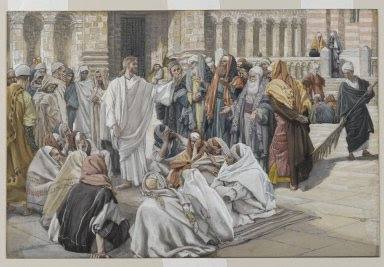The Creator displayed a new creation to us who had come from Him: He came forth from a womb that had received no seed, and He left it intact as it had been, so that at the sight of this marvel, we would sing to her and cry out:
Hail, O Blossom of Incorruption!
Hail, O Crown of Self-mastery!
Hail, O you who shone forth as a Sign of Resurrection!
Hail, O you who displayed the Life of Angels!
Hail, Fruitful Tree from whom believers feed!
Hail, Shady Glen where many are sheltered!
Hail, O you who have born the Guide of the Lost!
Hail, Source of Life to the captives' Release!
Hail, O you who unsettled even the Just Judge!
Hail, Indulgence of many who have fallen!
Hail, O Stole for those who lack freedom to speak!
Hail, O Tenderness who exceed all desire!
Hail, O Bride and Maiden ever-pure!
[RESPONSE]: Hail, O Bride and Maiden ever-pure!
KONTAKION
Now that we have seen this strange birth, let us estrange ourselves from the world and turn our minds to heaven: indeed, it is for this that the God Most High appeared on earth as a lowly man, desiring to draw up to heaven those who cry out to Him: "Alleluia!"[RESPONSE]: Alleluia!
EIGHTH CHANT
While fully present amid those below, the uncircumscribed Word was in no way absent from those above: for what happened was a divine condescension, and not a moving from one place to another: and it was a birth from a Virgin inspired by God, who heard these words: Hail, O Space of the Spaceless God!
Hail, O Gate of the Sublime Mystery!
Hail, O Message unsure to men without faith!
Hail, O Glory most certain to those who believe!
Hail, O Sacred Chariot of the One above the Cherubim!
Hail, Perfect Dwelling of the One above the Seraphim!
Hail, O you who reconciled opposites!
Hail, O you who combined maidenhood and motherhood!
Hail, O you through whom Paradise was opened!
Hail, O Key to the Kingdom of Christ!
Hail, O Hope for the Ages of Bliss!
Hail, O Bride and Maiden ever-pure!
[RESPONSE]: Hail, O Bride and Maiden ever-pure!
KONTAKION
The whole order of the Angels marveled at the great work of your becoming a man: for they saw the One Inaccessible as God become a Man accessible to all, living with us and hearing us cry out: "Alleluia!"[RESPONSE]: Alleluia!













